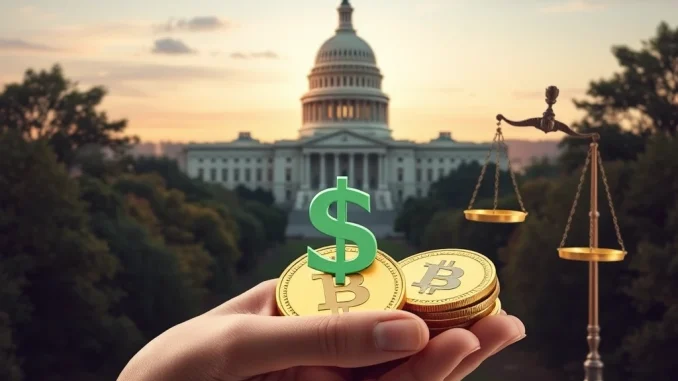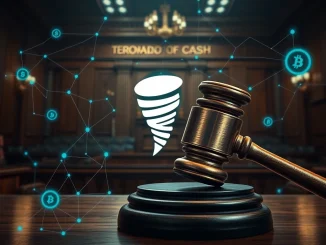
Big news in the world of digital assets! A crucial stablecoin bill, known as the GENIUS Act, has just taken a significant step forward by clearing the U.S. Senate. This development marks a pivotal moment for stablecoin regulation in the United States, pushing the industry closer to a clear federal framework.
What Does This Senate Crypto Bill Accomplish?
The GENIUS Act, as reported by Decrypt, aims to establish a comprehensive federal framework specifically for the issuance and trading of dollar-backed tokens. Until now, the regulatory landscape for stablecoins in the U.S. has been fragmented, often leaving issuers and users navigating a patchwork of state-level rules or facing uncertainty under existing financial regulations. This Senate crypto bill seeks to change that by providing a unified approach.
Key aspects addressed by the proposed legislation typically include:
- Defining stablecoins and their issuers.
- Setting requirements for reserves backing stablecoins.
- Establishing oversight responsibilities for federal agencies.
- Outlining rules for stablecoin trading platforms.
Such a framework is intended to bring stability and clarity to the market, potentially encouraging broader adoption while mitigating risks for consumers and the financial system.
The Path to Becoming US Stablecoin Law
With the Senate’s approval, the GENIUS Act isn’t law yet. It now heads to the House of Representatives for a vote. If the House passes the bill, it would then proceed to the President’s desk for signature. The report indicates that President Trump’s signature would be the final step for it to become US stablecoin law.
This legislative process highlights the increasing attention that digital assets, particularly stablecoins, are receiving at the highest levels of government. The journey through both chambers of Congress involves debate, potential amendments, and ultimately, a consensus on how best to integrate these digital currencies into the existing financial ecosystem.
Why is Clear Crypto Regulation Needed?
The push for clear crypto regulation, especially concerning stablecoins, stems from several factors:
- Market Growth: Stablecoins have become a significant part of the crypto market, used for trading, payments, and lending. Their increasing use necessitates clear rules to ensure stability and integrity.
- Financial Stability Concerns: Regulators are concerned about the potential risks large, widely used stablecoins could pose to traditional financial markets if not properly managed and regulated.
- Consumer Protection: A federal framework can help protect users by ensuring stablecoins are adequately backed and that issuers operate transparently.
- Innovation vs. Risk: Policymakers are trying to balance fostering innovation in digital finance with the need to manage potential risks like illicit finance and market manipulation.
Passing this stablecoin bill is seen by many as a positive step towards providing the certainty needed for the stablecoin market to mature responsibly.
What Happens Next?
All eyes are now on the House of Representatives. The timeline for a House vote is uncertain and can depend on various factors, including committee reviews and the legislative calendar. The outcome of the House vote will determine whether this significant stablecoin regulation moves closer to becoming federal law or faces further hurdles.
Stakeholders across the crypto industry, traditional finance, and regulatory bodies will be closely watching the proceedings. The potential enactment of the GENIUS Act could set a global precedent for how major economies approach the regulation of digital currencies pegged to fiat.
This development underscores the dynamic nature of the regulatory environment surrounding digital assets. As the technology evolves, so too does the need for clear, effective rules to govern its use.
Conclusion: The Senate’s passage of the GENIUS Act is a landmark event for stablecoin regulation in the U.S. While not yet law, this Senate crypto bill represents a major stride towards establishing a federal framework for stablecoins. The focus now shifts to the House and potentially the President’s signature to finalize what could become a defining piece of US stablecoin law. Staying informed about these legislative developments is crucial for anyone involved in or interested in the future of digital finance and crypto regulation.



